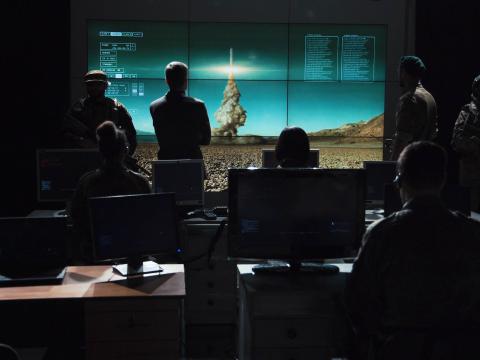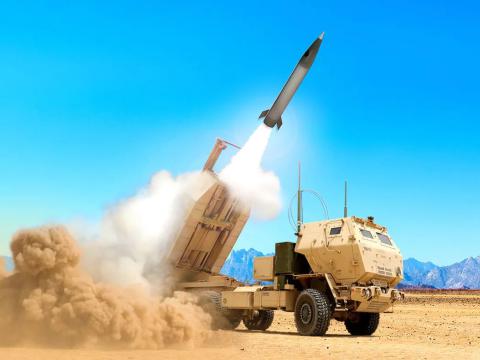Having the Guts to Say No
As a group, generals tend to be relentlessly positive. The pre-eminent U.S. soldier of recent years, Gen. Colin Powell, USA (Ret.), likes to remind us that, “Perpetual optimism is a force multiplier.” War and military operations are hard enough, but gloom and defeatism only make things harder. In combat, a morale edge sure helps. It is not by accident that Medal of Honor recipient Audie Murphy’s outfit, the U.S. Army’s famous 15th Infantry Regiment, has as its motto, “Can Do.”
As the more skeptical Mr. Murphy (he of the law, not Audie) reminds us, a great deal can and will go wrong in all human endeavors, especially war. But dwelling too much on potential problems surely will paralyze a military leader. Such hesitation spreads like a choking miasma. It stymies subordinate commanders and confuses the rank and file. Half-hearted attacks fail. In contrast, the side that knows its business and hangs in there for one more hard push often carries the day. That last winning surge can come from the will of a general who seizes an opportunity by seeing even a cracked, dirty glass as half-full. Winning in battle is all about positive action.
Sometimes senior commanders must size up the situation in minutes and pull the trigger. Under those conditions, seeing a chance and taking it may work just fine. At other junctures, particularly at the strategic level, there is time to consider conditions more fully. When regarding any strategic glass du jour, it is wise to recognize the real water level and not kid yourself, your peers or your bosses if it is lacking. An optimistic outlook helps a person find opportunities, but sometimes those opportunities just are not there, no matter how much anyone hopes for them. There is a responsibility for even the most positive people in uniform to tell superiors, military and civilian, the limits of “can do.”
That is exactly what happened 60 years ago in 1954, when President Dwight D. Eisenhower and his inner circle of foreign policy advisers were confronted with a dire situation in French Indochina. In the western uplands of what is now northern Vietnam, some 14,000 French soldiers were encircled and besieged by more numerous and aggressive Vietnamese Communists in the valley of Dien Bien Phu. France requested massive U.S. intervention, led by bombers, perhaps even using nuclear weapons. Eisenhower, a former five-star general, the senior U.S. commander in the European Theater of World War II, the liberator of Paris in 1944 and the first Supreme Allied Commander of NATO as recently as 1952, very much wanted to help the embattled French. His chairman of the Joint Chiefs of Staff (JCS), Adm. Arthur W. Radford, USN, fed the president’s proclivities, sketching out a potential bombing campaign called operation Vulture. Adm. Radford thought it would be rapid, decisive and successful.
Today, in accord with the 1986 Goldwater-Nichols Act, Adm. Radford’s successor as JCS chairman is the sole military adviser to the president. In 2014, Adm. Radford’s enthusiastic recommendation for operation Vulture air strikes would have been the sum of military advice, unless the president asked to speak to someone else. But 60 years ago, the individual service chiefs still had a place at the table. Eisenhower’s Army chief, Gen. Matthew B. Ridgway, USA, very much had something to say. And he did.
Few U.S. Army generals were more optimistic than Gen. Ridgway, a founding father of the airborne community. Someone who leads paratroopers into the dark sky behind enemy lines had better be positive and forceful, or he should not even jump out of the plane. Gen. Ridgway led by example, rifle in hand, through the bloody Normandy hedgerows of 1944. When the U.S. Eighth Army faltered in Korea in the grim winter of 1950-51, Gen. Ridgway took charge and punched north in the face of tenacious Chinese resistance. He had even served in the 15th Infantry Regiment, and so knew well the ideal of “Can Do.” But when he regarded Dien Bien Phu, this general knew better. This mission was “can’t do,” and as they said in the airborne, it was wrong “all the way.”
Gen. Ridgway knew Eisenhower, his old wartime commander and fellow West Pointer, quite well. When it came time for the Army chief to address the president, Gen. Ridgway pulled no punches. Sure, you could intervene at Dien Bien Phu, he said, but bombing would not do it alone. You would have to send ground troops: 10 divisions, a million soldiers, and all into a backwater corner of the globe as far as it could be from the United States. Eisenhower, an optimist himself, grimaced as his Army chief of staff laid it out. But the decision was obvious: Don’t go. That time, the United States did not.
It was different a decade later, and the United States went into Vietnam with tragic results. At the time, the public suspected that the military agreed with the escalation of the war. Privately, some of the key generals and admirals did not. They tried to make their case from inside, like Gen. Ridgway, but they did not spell it out so starkly. None had the guts to say no. That sad fact haunted Army Chief of Staff Gen. Harold K. Johnson, USA, to his grave.
Do we know better today? One would hope so. Yet in 2002-03, the country pondered biting off what became two simultaneous, long-haul counterinsurgencies in Afghanistan and Iraq. We still do not yet know the full inner workings of that recent period. We do know that Army Chief of Staff Gen. Eric K. Shinseki, USA, warned of a need for hundreds of thousands of troops to secure Iraq. The senior leaders at the time blew him off.
Gen. Shinseki had the guts to say no. But of course, that assumes somebody is listening.
Lt. Gen. Daniel P. Bolger, USA (Ret.), is a former troop commander in Iraq and Afghanistan. The author of seven books and numerous articles, he currently teaches at North Carolina State University.




Comment
Response
I don't quite follow your point or rationale in this opinion piece. I'd surmise you are attempting to highlight the notion that senior leaders should be ready and willing to speak frankly and say "no" to political leaders at the peril of their own professional career. Your point however is clouded by the positive "can do" lead-in and mis-used examples. Your citing of Eisenhowers Dien Bien Phu discussion with Radford and and Ridgway is one such example. You portray Ridgway as the ever faithful soldier, but when it came to Vietnam, Ridgway heroically says "can't do." In reality, Ridgway was a constant critic of Eisenhower and the defense strategy of his administration. Ridgway wanted a larger army, an army nuclear role, and less emphasis on Air and Naval power. It's no surprise - nor a gut check that in late '53, that Ridgway would push back against Eisenhower to support the colonial French in Indo-china. Would it not have been a greater gut check to figure someway to assist the French? If not in an effort to help them "win", perhaps use American military might to come to some better solution to the defeat at Dien Bien Phu, and the subsequent complete French withdrawal from Indo-China, which of course put us on the track to our Vietnam conflict, communist regimes in Laos, and genocide in Cambodia. As per military advice, I'm certain that every president since Goldwater-Nichols has sought advice from many fronts on military matters. The exception, may be General Powell, who so dominated the JCS, that he prevented other Service leaders and senior DoD civilians from providing advice to the President. In fact, he frequently contravened the GNA, which does not say the CJCS is the "sole" military advisor, it states the CJCS is the "principal" military advisor and consequently the CJCS "shall" present dissenting opinions from the other service chiefs to the president, and...the other service chiefs serve also as military advisors to the president. Your summation concerning 2002-2003 is off-target as well. There indeed was plenty of military advice against the Iraqi operations and just as much "can do" for the operation. However, the "NOs" more frequently concerned how to conduct the operation and the choice of overall strategy for the campaign. Our civilian leadership understood the pros/cons and directed the military to proceed as it should. General Shinseki however certainly had no gut check during this period, he simply answered a question to congress that unbeknownst to him was in conflict with the Secretary of Defense, the COCOM commander, and the administration. Indeed few listened to him in the DOD, not because of his countering views, but more because of his unusual reticence on any matter. I think that is the point you were making is that military leaders at all levels shouldn't be afraid to speak the truth, provide their honest opinion, or to speak truth to power, however...I don't think they need a "gut check" for that...it should be present all in the time in their training, responsibilities, and ultimately in their being!
Comments